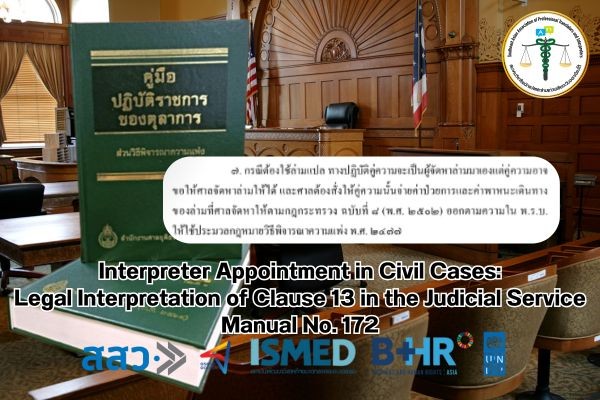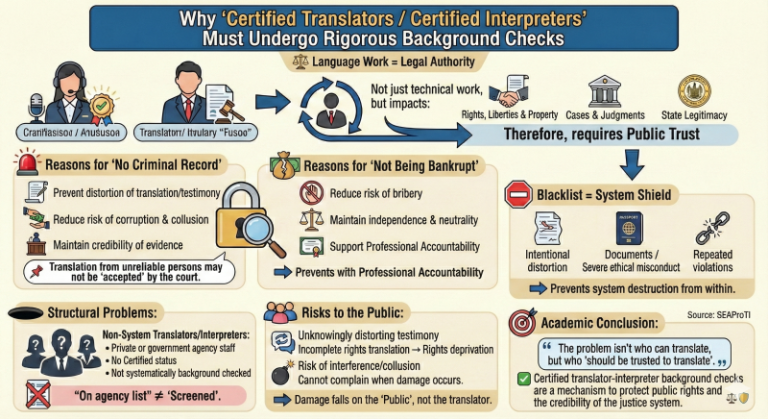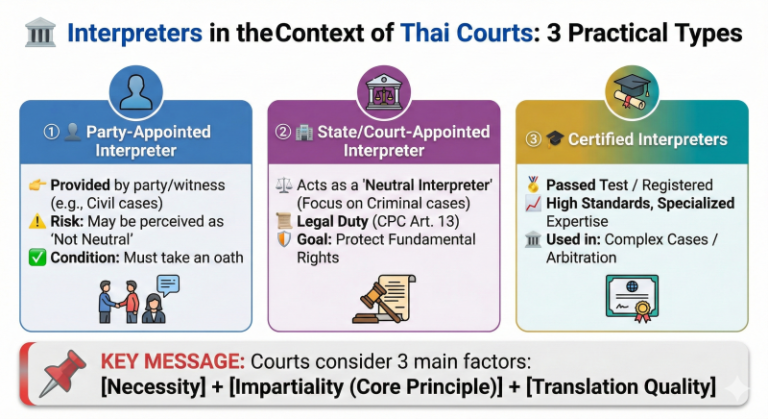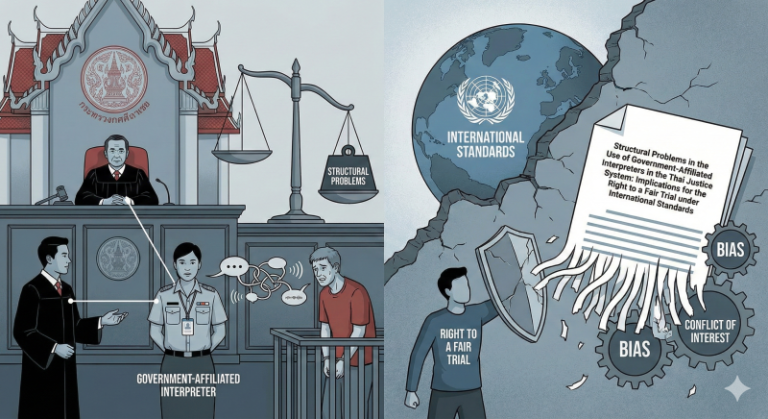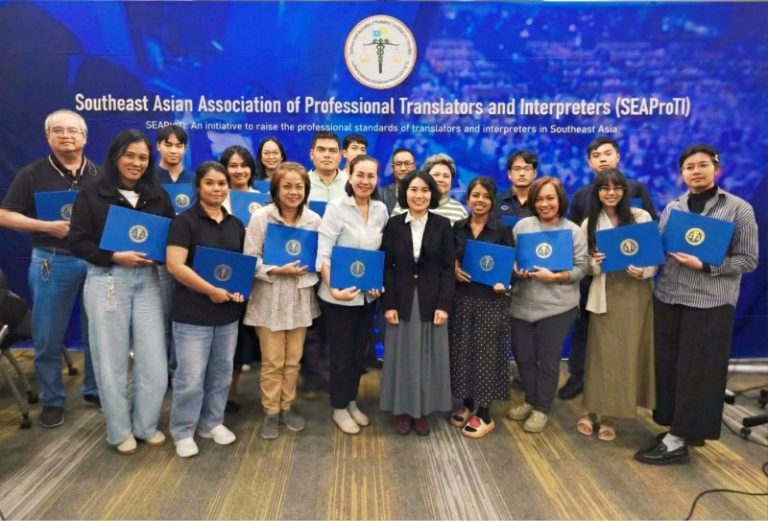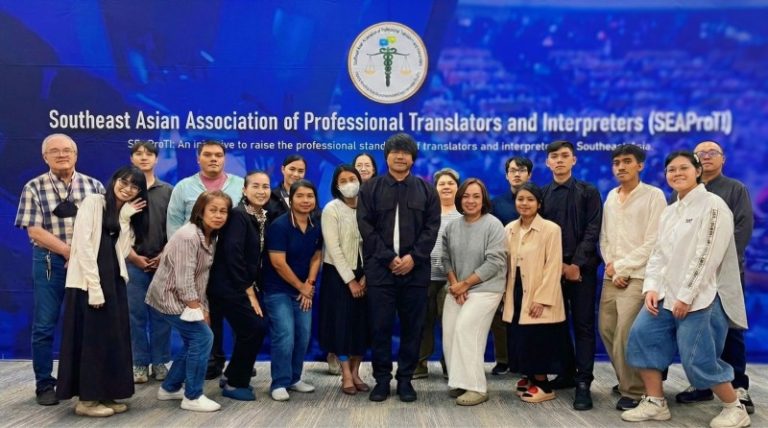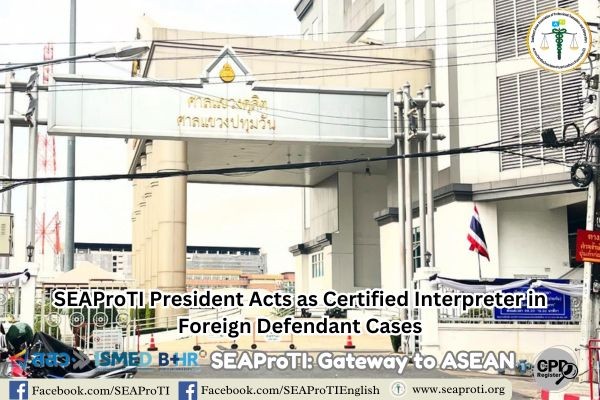Interpreter Appointment in Civil Cases:
Legal Interpretation of Clause 13 in the Judicial Service Manual No. 172
Observations on Judicial Discretion and Party Rights in Requesting Interpreters
June 28, 2025, Bangkok – This article analyzes legal principles and judicial practice regarding the appointment of interpreters in civil cases, as set out in Clause 13 of the Judicial Service Manual: Civil Procedure Section, No. 172. The provision states that the court may appoint an interpreter when the use of a non-Thai language is deemed necessary. This authority is grounded in Ministerial Regulation No. 8 (2019), issued under the Act on the Application of the Civil Procedure Code B.E. 2477 (1934). The article clarifies that although the court has the authority to appoint interpreters, litigants are also permitted to bring their own interpreters. Importantly, no law mandates the court to provide interpreters in every case. The article offers legal interpretation and seeks to promote accurate public understanding of the court’s role in ensuring language accessibility in civil proceedings.
Introduction
Language plays a vital role in ensuring equitable access to justice, especially in civil litigation involving parties or witnesses who cannot communicate in Thai. Although the Civil Procedure Code does not explicitly address the use of interpreters—as the Criminal Procedure Code does—the Judicial Service Manual offers internal procedural guidance on this matter (Office of the Judiciary, 2019).
This article aims to interpret the meaning and legal implications of Clause 13 and whether the court is obligated to appoint an interpreter or whether parties may do so independently.
Key Content of Clause 13
Clause 13, Observation No. 7 states:
“7. In cases where interpretation is required, it is common practice for the parties to arrange their own interpreter. However, a party may request the court to provide one. In such a case, the court must order that party to pay the interpreter’s per diem and travel expenses in accordance with Ministerial Regulation No. 8 (B.E. 2502), issued under the Act on the Application of the Civil Procedure Code, B.E. 2477.”
From this text, the core principles are as follows:
- The court has discretion to appoint interpreters when deemed necessary.
- The use of foreign languages in proceedings must be approved by the court.
- The court may appoint interpreters through the Office of the Judiciary, in accordance with the Ministerial Regulation.
Interpretation in Practice: Obligation or Discretion?
In practice, this provision does not impose an obligation on the court to appoint interpreters in every case. Rather, it provides the court with discretionary authority, particularly when no interpreter is already available or when requested by the parties.
Conversely, parties may provide their own interpreters, subject to the court’s approval and provided the interpreter can fulfill their duties in accordance with court standards.
This flexible interpretation aligns with the principle of procedural fairness without overburdening the judiciary with a fixed mandate (Panya, 2023).
Judicial Authority under Ministerial Regulation No. 8 (2019)
- This regulation was issued under the authority of the Act on the Application of the Civil Procedure Code B.E. 2477. It primarily facilitates linguistic accessibility for parties or witnesses using non-Thai languages. It reflects Thailand’s commitment to ensuring equal access to justice without language barriers (Office of the Judiciary, 2019).
Policy Recommendations
- Establish centralized regulations defining minimum qualifications for interpreters in civil cases.
- Disseminate accurate legal information to prevent the widespread misconception that courts are always required to appoint interpreters.
- Increase budgetary and institutional support within the judiciary for interpreter provision where necessary.
Conclusion
Clause 13 of the Judicial Service Manual does not impose a legal obligation on courts to provide interpreters in all civil cases. Instead, it allows courts to exercise discretion based on necessity and authorizes interpreter appointments through existing judicial mechanisms. Simultaneously, litigants retain the right to bring their own interpreters, subject to court oversight. This approach promotes flexibility and fairness in civil procedure and upholds access to justice for non-Thai-speaking parties.
Further Reading: Judicial Service Manual – Civil Procedure Section, No. 172
References:
- Office of the Judiciary. (2019). Judicial Service Manual: Civil Procedure Section, No. 172. Bangkok: Office of the Judiciary.
- Office of the Judiciary. (2019). Ministerial Regulation No. 8 B.E. 2562 (2019) under the Act on the Application of the Civil Procedure Code B.E. 2477. Bangkok: Royal Thai Government Gazette.
- Panya, T. (2023). Interpreter Use in Civil Justice: Structural Barriers and Reform Proposals. Journal of Law and Justice Process, 12(1), 22–39.
- For further details, see Judicial Service Manual: Civil Procedure Section, No. 172 (Office of the Judiciary, 2019).
SEAProTI’s certified translators, translation certification providers, and certified interpreters:
The Southeast Asian Association of Professional Translators and Interpreters (SEAProTI) has officially announced the criteria and qualifications for individuals to register as “Certified Translators,” “Translation Certification Providers,” and “Certified Interpreters” under the association’s regulations. These guidelines are detailed in Sections 9 and 10 of the Royal Thai Government Gazette, issued by the Secretariat of the Cabinet under the Office of the Prime Minister of the Kingdom of Thailand, dated July 25, 2024, Volume 141, Part 66 Ng, Page 100.
To read the full publication, visit the Royal Thai Government Gazette
การจัดหาล่ามในคดีแพ่ง: การตีความตามข้อ 13 แห่งคู่มือปฏิบัติราชการตุลาการ เลขที่ 172
ข้อสังเกตเชิงกฎหมายเกี่ยวกับอำนาจศาลและสิทธิของคู่ความในการร้องขอล่าม
28 มิถุนายน 2568, กรุงเทพมหานคร – บทความนี้วิเคราะห์แนวทางปฏิบัติและหลักการทางกฎหมายเกี่ยวกับการจัดหาล่ามในคดีแพ่งตามข้อ 13 แห่ง คู่มือปฏิบัติราชการของตุลาการ ส่วนวิธีพิจารณาความแพ่ง เลขที่ 172 ซึ่งระบุว่า ศาลสามารถจัดหาล่ามให้ได้หากเห็นความจำเป็นในการใช้ภาษาอื่นนอกเหนือจากภาษาไทย โดยใช้อำนาจตามกฎกระทรวง ฉบับที่ 8 พ.ศ. 2562 ที่ออกตามพระราชบัญญัติให้ใช้ประมวลกฎหมายวิธีพิจารณาความแพ่ง พ.ศ. 2477 บทความชี้ให้เห็นว่า แม้ศาลจะมีอำนาจในการจัดหาล่าม แต่คู่ความก็สามารถจัดหาล่ามของตนเองได้ และไม่มีข้อกำหนดทางกฎหมายใดบังคับให้ศาลต้องจัดหาล่ามในทุกกรณี บทความนี้จึงมีเป้าหมายเพื่อเสนอตีความที่ชัดเจนและส่งเสริมความเข้าใจที่ถูกต้องต่อบทบาทของศาลในการคุ้มครองสิทธิทางภาษาของคู่ความในคดีแพ่ง
บทนำ
ในกระบวนการยุติธรรมโดยเฉพาะคดีแพ่ง การใช้ภาษามีบทบาทสำคัญต่อการเข้าถึงสิทธิของคู่ความอย่างเท่าเทียม โดยเฉพาะในกรณีที่มีคู่ความหรือพยานที่ไม่สามารถใช้ภาษาไทยในการดำเนินคดีได้ แม้กฎหมายวิธีพิจารณาความแพ่งจะไม่ได้บัญญัติเรื่องการใช้ล่ามไว้อย่างชัดเจนเช่นคดีอาญา แต่คู่มือปฏิบัติราชการของตุลาการได้ระบุแนวปฏิบัติในเรื่องนี้ไว้ในลักษณะคำแนะนำภายใน (สำนักงานศาลยุติธรรม, 2562)
บทความนี้จึงตั้งใจศึกษาความหมายและผลทางกฎหมายของข้อ 13 แห่งคู่มือฯ รวมถึงการตีความว่าศาลมีหน้าที่จัดหาล่ามหรือไม่ และคู่ความมีสิทธิในการจัดหาล่ามด้วยตนเองเพียงใด
ใจความสำคัญของข้อ 13 แห่งคู่มือฯ
ข้อ 13 ระบุในข้อสังเกตุ ข้อที่ 7ว่า:
“7. กรณีต้องใช้ล่ามแปล ทางปฏิบัติคู่ความจะเป็นผู้จัดหาล่ามมาเองแต่คู่ความอาจขอให้ศาลจัดหาล่ามให้ได้ และศาลต้องสั่งให้คู่ความนั้นจ่ายค่าป่วยการและค่าพาหนะเดินทางของล่ามที่ศาลจัดหาให้ตามกฎกระทรวง ฉบับที่ 8 (พ.ศ. 2502) ออกตามความใน พ.ร.บ. ให้ใช้ประมวลกฎหมายวิธีพิจารณาความแพ่ง พ.ศ. 2477”
จากข้อความดังกล่าวสามารถสรุปสาระสำคัญได้ว่า:
- ศาลมี “อำนาจ” ในการจัดหาล่าม หากเห็นว่ามีความจำเป็น
- การใช้ภาษาต่างประเทศในกระบวนการพิจารณาคดีต้องได้รับการอนุมัติจากศาล
- ศาลสามารถดำเนินการจัดหาล่ามโดยใช้กลไกของสำนักงานศาลภายใต้กฎกระทรวง
การตีความในทางปฏิบัติ: หน้าที่ศาลหรือสิทธิของคู่ความ
ในทางปฏิบัติ ข้อความดังกล่าวมิได้หมายความว่า “ศาลมีหน้าที่ต้องจัดหาล่ามให้ในทุกกรณี” แต่เป็นการเปิดช่องทางให้ “ศาลมีอำนาจ” พิจารณาความจำเป็นในการจัดหาล่าม โดยเฉพาะในกรณีที่ไม่มีล่ามอยู่แล้ว หรือเมื่อคู่ความร้องขอ
ในอีกด้านหนึ่ง คู่ความก็สามารถจัดหาล่ามมาด้วยตนเองได้ หากศาลเห็นว่าเหมาะสม และล่ามนั้นสามารถปฏิบัติหน้าที่ได้อย่างถูกต้องตามระเบียบของศาล
กล่าวได้ว่าคู่มือฉบับนี้ยืนยันหลักความยืดหยุ่นในกระบวนการพิจารณาคดีแพ่ง ไม่ได้สร้างภาระหน้าที่ทางกฎหมายให้แก่ศาล แต่ให้แนวทางสนับสนุนกระบวนการให้ดำเนินไปอย่างเป็นธรรม (ปัญญา, 2566)
อำนาจศาลตามกฎกระทรวง ฉบับที่ 8 พ.ศ. 2562
กฎกระทรวงฉบับนี้ออกตามอำนาจของพระราชบัญญัติให้ใช้ประมวลกฎหมายวิธีพิจารณาความแพ่ง พ.ศ. 2477 โดยมีสาระสำคัญในเรื่องการอำนวยความสะดวกทางภาษาต่อคู่ความหรือพยานที่ใช้ภาษาต่างประเทศ ซึ่งสะท้อนหลักการคุ้มครองสิทธิของบุคคลในการเข้าถึงกระบวนการยุติธรรมโดยไม่ถูกจำกัดด้วยกำแพงทางภาษา (สำนักงานศาลยุติธรรม, 2562)
ข้อเสนอแนะเชิงนโยบาย
- ควรจัดทำระเบียบกลางว่าด้วยคุณสมบัติของล่ามในคดีแพ่ง เพื่อกำหนดมาตรฐานขั้นต่ำสำหรับล่ามที่คู่ความนำมาใช้ในศาล
- ส่งเสริมการเผยแพร่ข้อเท็จจริง ว่าไม่มีบทบัญญัติบังคับให้ศาลต้องจัดหาล่ามในทุกกรณี เพื่อป้องกันความเข้าใจคลาดเคลื่อนของคู่ความ
- เพิ่มงบประมาณและกลไกสนับสนุนภายในสำนักงานศาล สำหรับการจัดหาล่ามในกรณีที่ศาลเห็นว่าเหมาะสม
สรุป
ข้อ 13 แห่งคู่มือปฏิบัติราชการของตุลาการไม่ได้กำหนดว่าศาลต้องจัดหาล่ามให้ทุกกรณี แต่เป็นการเปิดทางให้ศาลพิจารณาและใช้อำนาจตามกฎกระทรวงเพื่ออำนวยความสะดวกในการดำเนินคดีแพ่งในกรณีที่จำเป็น ในขณะเดียวกัน คู่ความยังสามารถจัดหาล่ามของตนเองได้ภายใต้การควบคุมของศาล ซึ่งเป็นแนวทางที่สอดคล้องกับหลักความยืดหยุ่นและความเป็นธรรมในกระบวนการพิจารณาคดีแพ่ง
อ่านเพิ่มเติม: คู่มือปฏิบัติราชการของตุลาการ ส่วนวิธีพิจารณาความแพ่ง เลขที่ ๑๗๒
อ้างอิง:
- สำนักงานศาลยุติธรรม. (2562). คู่มือปฏิบัติราชการของตุลาการ ส่วนวิธีพิจารณาความแพ่ง เลขที่ 172. กรุงเทพฯ: สำนักงานศาลยุติธรรม.
- สำนักงานศาลยุติธรรม. (2562). กฎกระทรวง ฉบับที่ 8 (พ.ศ. 2562) ออกตามความในพระราชบัญญัติให้ใช้ประมวลกฎหมายวิธีพิจารณาความแพ่ง พ.ศ. 2477. กรุงเทพฯ: ราชกิจจานุเบกษา.
- ปัญญา ทองแก้ว. (2566). การใช้ล่ามในกระบวนการยุติธรรมทางแพ่ง: ปัญหาเชิงโครงสร้างและข้อเสนอเพื่อการปฏิรูป. วารสารกฎหมายและกระบวนการยุติธรรม, 12(1), 22–39.
- ดูรายละเอียดเพิ่มเติมได้ใน คู่มือปฏิบัติราชการของตุลาการ ส่วนวิธีพิจารณาความแพ่ง เลขที่ ๑๗๒ (สำนักงานศาลยุติธรรม, 2562)
เกี่ยวกับนักแปลรับรอง ผู้รับรองการแปล และล่ามรับรองของสมาคมวิชาชีพนักแปลและล่ามแห่งเอเชียตะวันออกเฉียงใต้
สมาคมวิชาชีพนักแปลและล่ามแห่งเอเชียตะวันออกเฉียงใต้ (SEAProTI) ได้ประกาศหลักเกณฑ์และคุณสมบัติผู้ที่ขึ้นทะเบียนเป็น “นักแปลรับรอง (Certified Translators) และผู้รับรองการแปล (Translation Certification Providers) และล่ามรับรอง (Certified Interpreters)” ของสมาคม หมวดที่ 9 และหมวดที่ 10 ในราชกิจจานุเบกษา ของสำนักเลขาธิการคณะรัฐมนตรี ในสำนักนายกรัฐมนตรี แห่งราชอาณาจักรไทย ลงวันที่ 25 ก.ค. 2567 เล่มที่ 141 ตอนที่ 66 ง หน้า 100 อ่านฉบับเต็มได้ที่: นักแปลรับรอง ผู้รับรองการแปล และล่ามรับรอง


